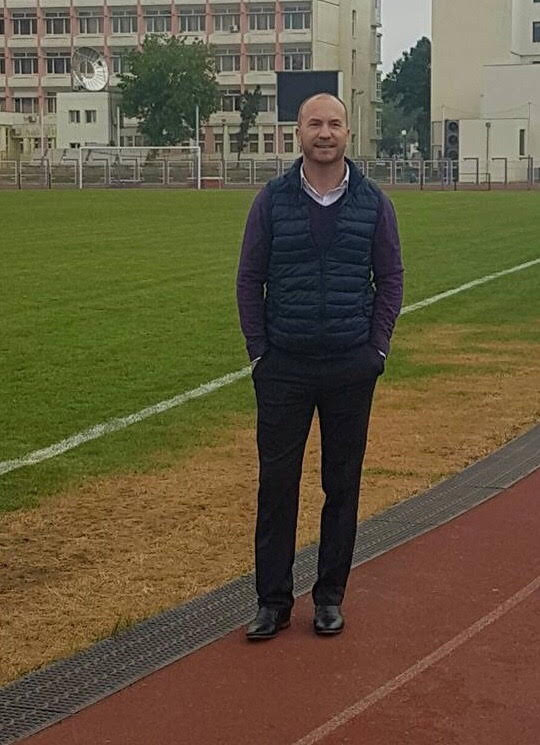 I have been playing soccer since I remember. More precisely, I started at the age of six years old. By the time I was 14, I got selected to play in Germany for Bayern Munich Youth Academy. I spent most of my youth years playing for Bayern Munich and 1860 Munich professional clubs. The Bundesliga is where I started playing as a professional for the second division, at the age of 18 years old. I continued to play in Europe for the Romanian professional soccer league. A serious injury had me return to the US to see a sports’ specialist. I decided to further my education at the University of Hartford, Connecticut and Salem State University.
I have been playing soccer since I remember. More precisely, I started at the age of six years old. By the time I was 14, I got selected to play in Germany for Bayern Munich Youth Academy. I spent most of my youth years playing for Bayern Munich and 1860 Munich professional clubs. The Bundesliga is where I started playing as a professional for the second division, at the age of 18 years old. I continued to play in Europe for the Romanian professional soccer league. A serious injury had me return to the US to see a sports’ specialist. I decided to further my education at the University of Hartford, Connecticut and Salem State University.
My coaching career started as an Assistant Coach for Salem State University. After a few seasons I moved on to coach a few private clubs and then Brighton High School, Boston. I started teaching at Brighton High and had the opportunity to coach the boys’ soccer team. For two seasons the team was ranked no. 1 in the state of Massachusetts, Division 1 soccer, where we made the state tournament back to back undefeated. A new opportunity and challenge found me coaching women soccer at Bunker Hill Community College. I spent three seasons with the program while also coaching club in the North Shore area before deciding to start my own academy. This sums up an experience of 20 years of playing professional and coaching between Europe as a professional player and the US as a coach.
The personal coaching and leadership plan is a very important aspect of my work. Through years of experience in coaching and playing soccer, I have reached the point where I am trying to put together my philosophy and all my experience for the service of others who share the passion for this sport. My coaches and parents taught me since early age that giving back is the right way to build the future generations.. Building my own academy has been a long time dream and has the purpose to give back to those who have limited chances.
Learn more about Private Lessons here »
My Coaching Philosophy
A coaching philosophy involves two major tasks: to get to know yourself better and to decide what your objectives are in coaching. The way I see and assess myself is as a role model for my players and my friends. I strongly believe I am a respectful, open-minded and loyal person. I give passion to my work, I am confident in my knowledge and in me as a person. I believe in honesty and communication at all levels. As a person, I believe in a second chance and fair game. I am devoted and always a team-player. That is how I was as a player, that is how I am as a person and as a coach. I expect my players to do their best. I am doing my best to get them to their maximum potential and expect them to commit as well. I put the team first and winning second. I am in this position for the fun of the sport, for the love of the game and how educating it can be, and for giving back to the younger generations. Along comes the perfection, the competitiveness and the results most wanted. In other words, this is who I am and that is what I preach as a coach.
My Coaching Style
I consider myself to be a coach who combines different styles. In the beginning I am definitely a commanding coach. I expect my players to listen, to follow my directions and execute. I want my team to have one direction, one value and to understand the purpose and the direction of the team. I make sure that all players will recognize the environment I put them into, in other words I want to make sure that besides having fun, they need to understand that accomplishing goals does not come by goofing around. So I install the rules, the discipline and the objective of the team. The beginning is assertive, the players need to see the way I am and they will respond accordingly. It helps me to evaluate them and connect me to them.
I have tested all styles of coaching, and here I mean the submissive style too; I will stick to the idea that allowing your players to play, just play and recognize the effort, will do nobody any good.
As my team gets to know me and vice-versa, I start using the cooperative-style which does give the players confidence and ability to trust their skills at a certain point. Once they are aware of their skills, of their surroundings in the game, how to be creative and what creative means, then and only then, you can allow them to use that creativity. As coach Guardiola says: “I will forgive if the players cannot get it right, but not if they do not try hard”. Empowering your players is important to get success. Automatically the players get motivated and competitive.
These coaching styles have been implemented to me by my previous coaches which allowed me to have success during my playing career. I strongly believe the transformational coaching style is always to be perfected and must adapted to different circumstances. There is no perfect coaching style. We can write down different terminologies, different styles but to me the most valuable thing is what you have in front of you every day and how you establish the relationship with your players.

